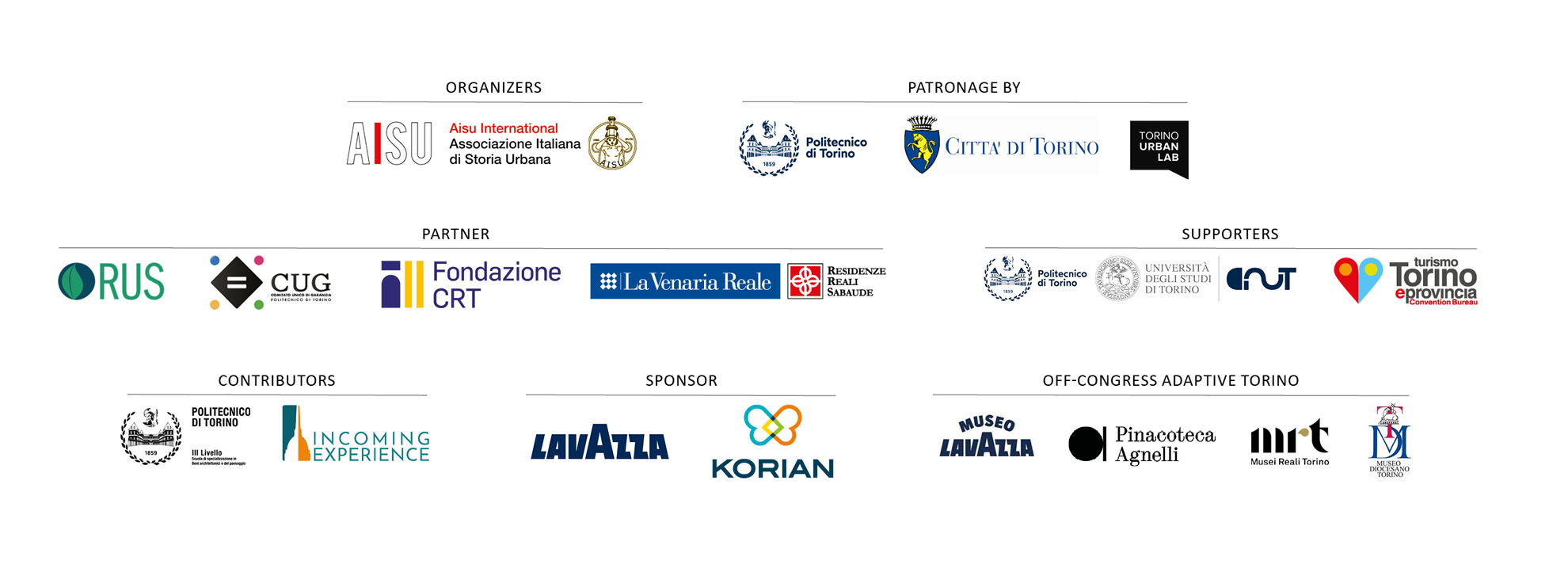
[COUNTER_NUMBER id=12123]
The 10th AISU Congress is organized by AISU with the Politecnico di Torino.
In 2019 we launched a theme that would lead us to consider those aspects of adaptiveness in the cities that have made and make this long history possible. The pandemic has forced us to postpone this appointment for a year, but it has also projected us towards new awareness. The pandemic experience has fostered our ability to better perceive certain aspects that are maybe less visible and understandable in ordinary conditions. The pandemic has fostered a new and different way of thinking, and we aim to generate greater awareness.The AISU Congress aims to stimulate studies and reflections, therefore, beyond the current circumstances and the urgency any extraordinary disastrous conditions for questioning the matter of adaptiveness in relation to urban history.
We will focus on the interpretative tools that come from this as well as from other major crises of various kinds (for example economic, demographic, social, health) caused by natural or man-induced traumas (including natural events, wars, terrorism), to reflect on the relationship between cities' adaptive or non-adaptive attitude and their developments. The great theme of the Congress is precisely to verify the adaptive or partially adaptive capacity / or inability that cities have demonstrated over time up to the present times, analyzing contexts, relationships, effects, phases, legacy.
For this purpose, we will use time as a decisive element: short times that can be traced back to elements of rupture and change, and long times that mark adaptations or non-adaptations, in developments that develop gradually.
Macrosession 1 has as its decisive aspect the great change, the disruptive and rapid transformation of a strongly consolidated structure. Macrosession 2 analyzes the change in slow developments spanning at least a few decades. These areas of work postulate mobility as a response to a crisis situation. Macrosession 3, on the other hand, questions the effects of immunity that a parallel crisis can equally entail. Macrosession 4 reflects on different types of resilience and on the relationships between resilience and adaptive capacity, or, possibly, with respect to the inability / acceptance to adapt. Macrosession 5 raises questions of approach to research, as well as methodological aspects and tools. Macrosession 6 proposes questions about the adaptiveness of the interactions between humanity and the environment over a very long time, starting with ancient history and the legacy of cultural and archaeological heritage. Macrosession 7 questions adaptiveness and precariousness, with different perspectives with respect to problems of marginality or with respect to demographic fluctuations. Macrosession 8 analyzes a specific period identifiable with the peak of the crisis and the effects of its impact, investigating the emergency conditions.
Macrosessions are very broad work areas that take into account various disciplinary fields and cultural geographies. These large umbrella-themes that serve to create areas of confrontation through very different disciplines that look to the city with different tools and objectives. The AISU Congress, as always, is an opportunity for a broad discussion, open to the plural disciplinary fields not only of urban history but also of urban and regional studies. Today more than ever we feel the need for this broad comparison to discuss the past and project ourselves towards the future. AISU international is inclusive, multisciplinary, plural, global.
With the 10th Congress as the culmination of the celebrations that began in 2020 remotely with the AISU Lectures, we will meet for a special toast to the 20 years of AISU!
The President
Rosa Tamborrino
Executive Scientific Committee
Sara Abram (Fondazione Centro Conservazione e Restauro “La Venaria Reale”), Marta Bottero (Politecnico di Torino – DIST), Donatella Calabi (Università Iuav di Venezia), Claudia Cassatella (Politecnico di Torino – DIST), Swati Chattopadhyay (University of California, Santa Barbara, USA), Daniela Ciaffi (Politecnico di Torino – DIST), Teresa Colletta (Università degli Studi di Napoli Federico II), Cristina Cuneo (Politecnico di Torino – DIST), Filippo De Pieri (Politecnico di Torino – DAD), Chiara Devoti (Politecnico di Torino – DIST), Carla Di Francesco (Fondazione Scuola dei Beni e delle Attività Culturali), Anat Falbel (EAHN Urban Representation Working Group, University of Rio de Janeiro), Marco Folin (Università di Genova), Caterina Giannattasio (SIRA – Società Italiana per il Restauro dell’Architettura, Università di Cagliari), Maria Adriana Giusti (Politecnico di Torino – DAD), Francesca Governa (Politecnico di Torino – DIST), Simon Gunn (Centre for Urban History (CUH), University of Leicester), Andrea Longhi (Politecnico di Torino – DIST), Andrea Maglio (Università di Napoli Federico II), Ermanno Malaspina (Università di Torino, DISH (Centro interdipartimentale di DH), Cristina Martelli (Università degli Studi di Firenze (UNIFI), Tatiana Mazali (Politecnico di Torino – DIST), Luca Mocarelli ( Università di Milano Bicocca), Sara Monaci (Politecnico di Torino – DIST), Sergio Onger (Università di Brescia), Heleni Porfyriou (CNR – ISPC – Roma), Marco Pretelli (Università di Bologna), David Graham Shane (Columbia University GSAAP, USA), Gabor Sonkoly (Eötvös Loránd University of Budapest, Hungary), Peter Stabel (European Association for Urban History (EAUH), University of Antwerp), Donatella Strangio (Università di Roma La Sapienza), Elena Svalduz (Università di Padova), Rosa Tamborrino (Politecnico di Torino – DIST), Ines Tolic (Università di Bologna), Cristina Trinchero (Università di TORINO, DISH (Centro interdipartimentale di DH), Maurizio Vivarelli (Università di Torino DISH Centro interdipartimentale di DH), Angioletta Voghera (Politecnico di Torino – DIST), Mauro Volpiano (Politecnico di Torino – DAD), Willeke Wendrich (University of California, Los Angeles, USA), Guido Zucconi (Università Iuav di Venezia).
AISU coordination group
Gerardo Doti, Fabio Mangone, Luca Mocarelli, Heleni Porfyriou, Guido Zucconi
Local coordination group
Cristina Cuneo, Chiara Devoti, Andrea Longhi, Fulvio Rinaudo, Mauro Volpiano
General coordination
Rosa Tamborrino
(AISU President, Politecnico di Torino – DIST)

